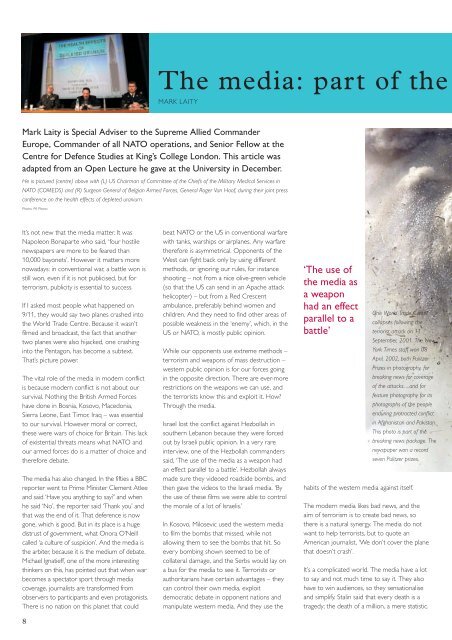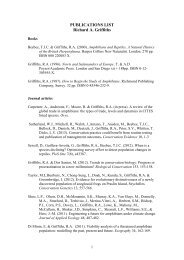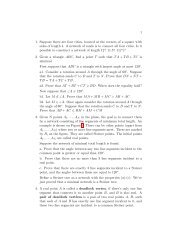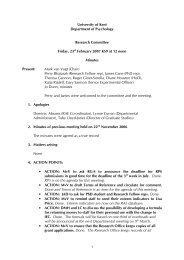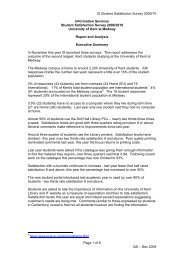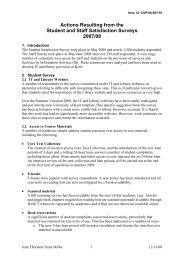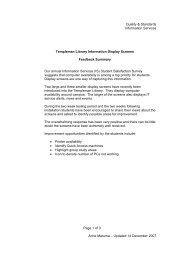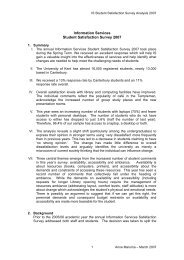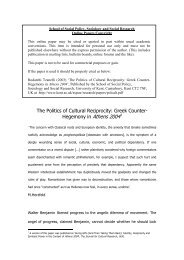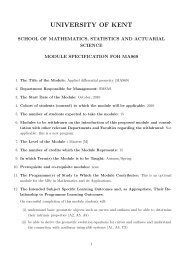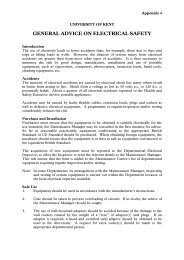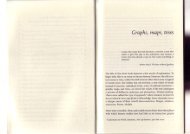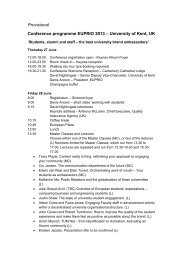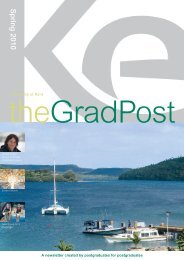Spring 2004 - University of Kent
Spring 2004 - University of Kent
Spring 2004 - University of Kent
You also want an ePaper? Increase the reach of your titles
YUMPU automatically turns print PDFs into web optimized ePapers that Google loves.
The media: part <strong>of</strong> the<br />
MARK LAITY<br />
Mark Laity is Special Adviser to the Supreme Allied Commander<br />
Europe, Commander <strong>of</strong> all NATO operations, and Senior Fellow at the<br />
Centre for Defence Studies at King’s College London. This article was<br />
adapted from an Open Lecture he gave at the <strong>University</strong> in December.<br />
He is pictured (centre) above with (L) US Chairman <strong>of</strong> Committee <strong>of</strong> the Chiefs <strong>of</strong> the Military Medical Services in<br />
NATO (COMEDS) and (R) Surgeon General <strong>of</strong> Belgian Armed Forces, General Roger Van Ho<strong>of</strong>, during their joint press<br />
conference on the health effects <strong>of</strong> depleted uranium.<br />
Photos: PA Photos<br />
It’s not new that the media matter. It was<br />
Napoleon Bonaparte who said, ‘four hostile<br />
newspapers are more to be feared than<br />
10,000 bayonets’. However it matters more<br />
nowadays: in conventional war, a battle won is<br />
still won, even if it is not publicised, but for<br />
terrorism, publicity is essential to success.<br />
If I asked most people what happened on<br />
9/11, they would say two planes crashed into<br />
the World Trade Centre. Because it wasn’t<br />
filmed and broadcast, the fact that another<br />
two planes were also hijacked, one crashing<br />
into the Pentagon, has become a subtext.<br />
That’s picture power.<br />
The vital role <strong>of</strong> the media in modern conflict<br />
is because modern conflict is not about our<br />
survival. Nothing the British Armed Forces<br />
have done in Bosnia, Kosovo, Macedonia,<br />
Sierra Leone, East Timor, Iraq – was essential<br />
to our survival. However moral or correct,<br />
these were wars <strong>of</strong> choice for Britain. This lack<br />
<strong>of</strong> existential threats means what NATO and<br />
our armed forces do is a matter <strong>of</strong> choice and<br />
therefore debate.<br />
The media has also changed. In the fifties a BBC<br />
reporter went to Prime Minister Clement Atlee<br />
and said ‘Have you anything to say?’ and when<br />
he said ‘No’, the reporter said ‘Thank you’ and<br />
that was the end <strong>of</strong> it. That deference is now<br />
gone, which is good. But in its place is a huge<br />
distrust <strong>of</strong> government, what Onora O’Neill<br />
called ‘a culture <strong>of</strong> suspicion’. And the media is<br />
the arbiter, because it is the medium <strong>of</strong> debate.<br />
Michael Ignatieff, one <strong>of</strong> the more interesting<br />
thinkers on this, has pointed out that when war<br />
becomes a spectator sport through media<br />
coverage, journalists are transformed from<br />
observers to participants and even protagonists.<br />
There is no nation on this planet that could<br />
8<br />
beat NATO or the US in conventional warfare<br />
with tanks, warships or airplanes. Any warfare<br />
therefore is asymmetrical. Opponents <strong>of</strong> the<br />
West can fight back only by using different<br />
methods, or ignoring our rules, for instance<br />
shooting – not from a nice olive-green vehicle<br />
(so that the US can send in an Apache attack<br />
helicopter) – but from a Red Crescent<br />
ambulance, preferably behind women and<br />
children. And they need to find other areas <strong>of</strong><br />
possible weakness in the ‘enemy’, which, in the<br />
US or NATO, is mostly public opinion.<br />
While our opponents use extreme methods –<br />
terrorism and weapons <strong>of</strong> mass destruction –<br />
western public opinion is for our forces going<br />
in the opposite direction. There are ever-more<br />
restrictions on the weapons we can use, and<br />
the terrorists know this and exploit it. How?<br />
Through the media.<br />
Israel lost the conflict against Hezbollah in<br />
southern Lebanon because they were forced<br />
out by Israeli public opinion. In a very rare<br />
interview, one <strong>of</strong> the Hezbollah commanders<br />
said, ‘The use <strong>of</strong> the media as a weapon had<br />
an effect parallel to a battle’. Hezbollah always<br />
made sure they videoed roadside bombs, and<br />
then gave the videos to the Israeli media. ‘By<br />
the use <strong>of</strong> these films we were able to control<br />
the morale <strong>of</strong> a lot <strong>of</strong> Israelis.’<br />
In Kosovo, Milosevic used the western media<br />
to film the bombs that missed, while not<br />
allowing them to see the bombs that hit. So<br />
every bombing shown seemed to be <strong>of</strong><br />
collateral damage, and the Serbs would lay on<br />
a bus for the media to see it. Terrorists or<br />
authoritarians have certain advantages – they<br />
can control their own media, exploit<br />
democratic debate in opponent nations and<br />
manipulate western media. And they use the<br />
‘The use <strong>of</strong><br />
the media as<br />
a weapon<br />
had an effect<br />
parallel to a<br />
battle’<br />
One World Trade Center<br />
collapses following the<br />
terrorist attack on 11<br />
September, 2001. The New<br />
York Times staff won 08<br />
April, 2002, both Pulitzer<br />
Prizes in photography, for<br />
breaking news for coverage<br />
<strong>of</strong> the attacks. ...and for<br />
feature photography for its<br />
photographs <strong>of</strong> the people<br />
enduring protracted conflict<br />
in Afghanistan and Pakistan.<br />
This photo is part <strong>of</strong> the<br />
breaking news package. The<br />
newspaper won a record<br />
seven Pulitzer prizes.<br />
habits <strong>of</strong> the western media against itself.<br />
The modern media likes bad news, and the<br />
aim <strong>of</strong> terrorism is to create bad news, so<br />
there is a natural synergy. The media do not<br />
want to help terrorists, but to quote an<br />
American journalist, ‘We don’t cover the plane<br />
that doesn’t crash’.<br />
It’s a complicated world. The media have a lot<br />
to say and not much time to say it. They also<br />
have to win audiences, so they sensationalise<br />
and simplify. Stalin said that every death is a<br />
tragedy; the death <strong>of</strong> a million, a mere statistic.


